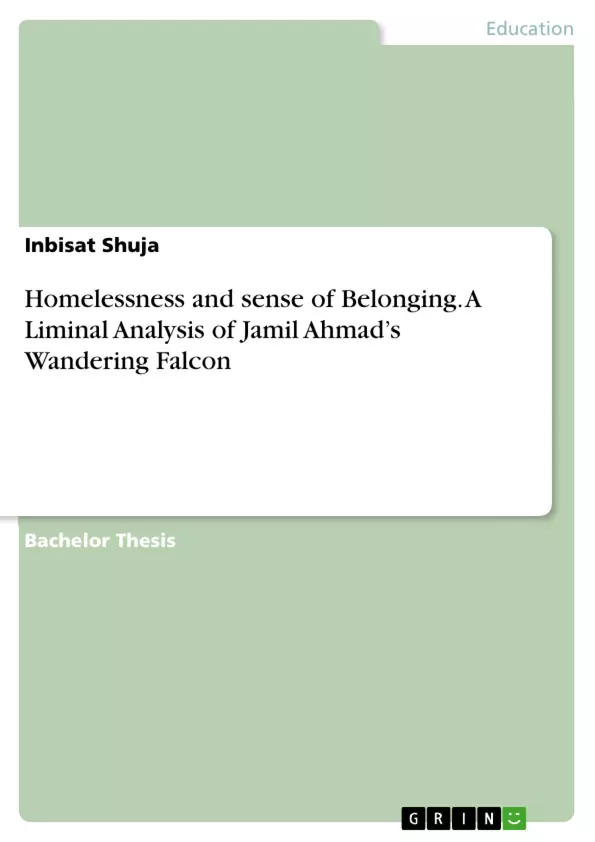
Homelessness and sense of Belonging. A Liminal Analysis of Jamil Ahmad’s Wandering Falcon
Bachelorarbeit, 2017
28 Seiten, Note: A
Leseprobe
Inhaltsverzeichnis (Table of Contents)
- Research Completion Certificate
- Acknowledgment
- Abstract
- Chapter 1: Introduction
- Chapter 2: Literature Review
- Chapter 3: Research Methodology
- Chapter 4: Discussion and Analysis
- Conclusion
- Work Cited
Zielsetzung und Themenschwerpunkte (Objectives and Key Themes)
This research explores the concept of homelessness and liminality in Jamil Ahmad's novel The Wandering Falcon (1931-2014). Utilizing Victor Turner's theory of liminality, the study aims to analyze the narrative through the lens of post-colonialism. The research examines the Baluchi tribal community and the urban Pakistani community to unveil the superficiality of civilization. The research aims to explore the sense of belonging experienced by the people residing on the Baluchi-Irani border zone. It further investigates various forms of boundaries present in the narrative.
- Homelessness and sense of belonging in the context of the Baluchi-Irani border
- Liminality and the experience of being in-between spaces and identities
- The portrayal of the Baluchi tribal community and its juxtaposition with urban Pakistani society
- The impact of political and social upheaval on the lives of individuals in the 1970s
- The exploration of boundaries, both physical and social, in the narrative
Zusammenfassung der Kapitel (Chapter Summaries)
Chapter 1: Introduction
This chapter introduces the context of the novel, The Wandering Falcon, set in the tumultuous 1970s. It highlights the political and social climate of Pakistan, including the first elections, the emergence of East Pakistan's independence, and the Baluch nationalists' rebellion. The chapter also outlines the research aims, which focus on exploring homelessness and sense of belonging, liminal experiences, and the façade of civilization. It highlights the specific geographical location of the study - the border region between Pakistan, Iran, and Baluchistan. This chapter sets the stage for the subsequent analysis of the novel.
Chapter 2: Literature Review
(Content not included due to spoiler concerns.)
Chapter 3: Research Methodology
(Content not included due to spoiler concerns.)
Chapter 4: Discussion and Analysis
(Content not included due to spoiler concerns.)
Schlüsselwörter (Keywords)
This research focuses on the interplay between homelessness, sense of belonging, and liminality in the context of Jamil Ahmad's The Wandering Falcon. Key themes include post-colonialism, Victor Turner's theory of liminality, the Baluchi tribal community, the urban Pakistani community, the Baluchi-Irani border zone, and the façade of civilization. These concepts are explored through the analysis of boundaries, both geographical and social, as depicted in the narrative.
Frequently Asked Questions
What is the central theme of Jamil Ahmad's "The Wandering Falcon"?
The novel explores homelessness, the sense of belonging, and the liminal lives of tribal communities in the border zones of Pakistan, Iran, and Afghanistan.
What does "liminality" mean in this context?
Liminality refers to the experience of being in-between spaces, identities, and legal structures, which is a key characteristic of the people living in border regions.
How does the research analyze the "façade of the civilized world"?
By juxtaposing the social structures of urban Pakistani society with the "communitas" of tribal groups, the study unveils the superficiality of modern civilization.
When was the book written and published?
The book was composed in the 1970s but remained unpublished for three decades until it was released in 2011.
Which theoretical framework is used in this study?
The research utilizes Victor Turner’s theory of liminality and examines the narrative through the lens of post-colonialism.
Details
- Titel
- Homelessness and sense of Belonging. A Liminal Analysis of Jamil Ahmad’s Wandering Falcon
- Note
- A
- Autor
- Inbisat Shuja (Autor:in)
- Erscheinungsjahr
- 2017
- Seiten
- 28
- Katalognummer
- V369717
- ISBN (eBook)
- 9783668478404
- ISBN (Buch)
- 9783668478411
- Dateigröße
- 610 KB
- Sprache
- Englisch
- Schlagworte
- Homelessness Belonging Borders The Wandering Falcon Jamil Ahmad Analysis
- Produktsicherheit
- GRIN Publishing GmbH
- Preis (Ebook)
- US$ 16,99
- Preis (Book)
- US$ 18,99
- Arbeit zitieren
- Inbisat Shuja (Autor:in), 2017, Homelessness and sense of Belonging. A Liminal Analysis of Jamil Ahmad’s Wandering Falcon, München, Page::Imprint:: GRINVerlagOHG, https://www.diplomarbeiten24.de/document/369717
- Autor werden
- Ihre Optionen
- Vertriebskanäle
- Premium Services
- Autorenprofil
- Textarten und Formate
- Services für Verlage, Hochschulen, Unternehmen

- © GRIN Publishing GmbH.
- Alle Inhalte urheberrechtlich geschützt. Kopieren und verbreiten untersagt.
- info@grin.com
- AGB
- Open Publishing
Der GRIN Verlag hat sich seit 1998 auf die Veröffentlichung akademischer eBooks und Bücher spezialisiert. Der GRIN Verlag steht damit als erstes Unternehmen für User Generated Quality Content. Die Verlagsseiten GRIN.com, Hausarbeiten.de und Diplomarbeiten24 bieten für Hochschullehrer, Absolventen und Studenten die ideale Plattform, wissenschaftliche Texte wie Hausarbeiten, Referate, Bachelorarbeiten, Masterarbeiten, Diplomarbeiten, Dissertationen und wissenschaftliche Aufsätze einem breiten Publikum zu präsentieren.
Kostenfreie Veröffentlichung: Hausarbeit, Bachelorarbeit, Diplomarbeit, Dissertation, Masterarbeit, Interpretation oder Referat jetzt veröffentlichen!
- GRIN Verlag GmbH
-
- Nymphenburger Str. 86
- 80636
- Munich, Deutschland
- +49 89-550559-0
- +49 89-550559-10
- info@grin.com
-









